Chapter 1
EARLY CHILDHOOD

I was born in the town of Taal, the province of Batangas in the Philippines, on September 12, 1906. I was the sixth of nine children born to Vicente Reyes, my father, and Vicenta Morales, my mother. They had six boys, three of whom died before I was born, and three girls.
|
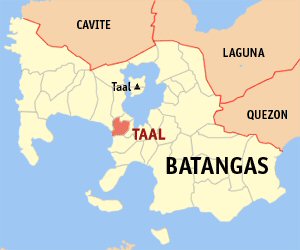
|
|
Map of the province of Batangas in the Philippines. The town of Taal is the dark orange area. The Taal Volcano is the black triangle.
|
Taal is only a short distance from the Taal Volcano which erupted in 1911, taking the lives of hundreds and devastating the surrounding countryside. This is the most vivid recollection of my boyhood.
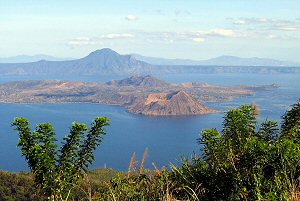
|
When the volcano erupted on that January night, I was wakened by a deafening explosion. Our concrete and mortar house was shaking. Father lit the kerosene lamp that hung from the ceiling. Mother, assisted by my older brother and sister, Agripino and Juaquina, quickly bundled our clothing and other belongings in bed sheets.
|
|
Taal Volcano is in the foreground, cone-shaped. What makes Taal Volcano unique is the fact that the volcano itself has a lake of its own inside its crater which is called the "Crater Lake" that was formed after an eruption.
- Click to Enlarge.
|
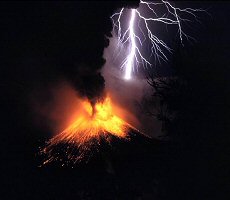 In no time, we were out of our house, fleeing the volcano's fury. Even though the volcano is in the middle of a lake many miles from our town, when we came out of the house it seemed only a block away. We felt the heat caused by the eruption. The sky was bright as daylight. This made our flight much easier. Mother, Agripino, then 12, and Juaquina, 14, were carrying the bundles on their heads. Father was carrying my younger sister, Salud, and youngest brother, Fernando; and I was toddling along. We had to run to keep pace with our parents, stopping to rest several times before we reached our destination late that day.
In no time, we were out of our house, fleeing the volcano's fury. Even though the volcano is in the middle of a lake many miles from our town, when we came out of the house it seemed only a block away. We felt the heat caused by the eruption. The sky was bright as daylight. This made our flight much easier. Mother, Agripino, then 12, and Juaquina, 14, were carrying the bundles on their heads. Father was carrying my younger sister, Salud, and youngest brother, Fernando; and I was toddling along. We had to run to keep pace with our parents, stopping to rest several times before we reached our destination late that day.
My parents must have known the farmers we took refuge with, for we stayed with them for two days until the danger was over. They even gave us food to take home with us. When we returned home, we found it undamaged by the eruption and earthquakes that had followed. In fact, the town of Taal sustained very little damage. The greatest destruction had occurred in the immediate vicinity of the volcano.
My early childhood was a happy time. We must have been a bunch of good and obedient children, as I don't remember any of us being spanked or punished for any misbehavior. We played in the house or in our own backyard, never in the streets. Playgrounds did not exist in those days in small provincial towns like Taal.
Our family life was a happy and normal one. We were of the upper middle class according to the standard of living at that time. We had a servant or two most of the time. Even though Father did not have a job or profession, our material needs were amply supplied. My grandfather had been a rich landowner and, upon his death, all of his property went to his only son, my father.
Father must have owned land which he rented or share cropped. Farmers often came, specially during harvest season, carrying vegetables and fruit and, sometimes, poultry and eggs for us. At the end of the rice harvest, people would come with bags of rice which Father would take to the town mill for processing. I can only surmise that Father was an absentee landlord. I cannot remember my parents ever being a bit concerned with our household or personal needs.
My parents were treated with deep respect and were always addressed as "Pu" by neighbors and acquaintances. "Pu", the equivalent to "sir" or "madam", was used when a person spoke to another whom he considered above him socially or otherwise, even if that person was younger. Children always addressed their parents and elders with "pu"; and this was religiously observed in my family.
Across the river from Taal is the town of Lemery where most of my father's relatives lived. Lemery is on Balayan Bay and Father used to take me swimming there. After the swim, we would visit his aunts and uncle, especially the aunt who owned a bakery shop. She would always give us a bag of baked goodies to take with us; and I would eat some of those goodies on our way home. I always looked forward to our trip to Lemery.
Click each photo to enlarge.
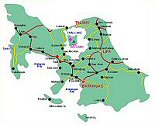
Map of the province of Batangas in the Philippines.
|
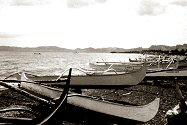
Boats at Balayan Bay.
|
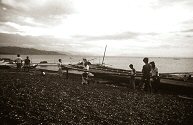
The Beach at Balayan Bay.
|
I must have been my father's favorite child. I was his chosen companion on his walks and swimming trips; and this must have made me closer to him than the other children. I was proud and happy to do errands for him, even at night, always being the first to volunteer for any task he wanted done outside of the house.
My obedience and eagerness to do anything for my parents such as going to the store even at night was perhaps the reason my father was partial to me, when choosing among his six children who would be with him on his shopping, swimming, and cock fighting trips.
Father never neglected the other children. I know he loved us all and meant no partiality in bestowing his affection. However, even as I look back over all these many years, I cannot help but feel that Father favored me over the others as a companion or as an errand boy.
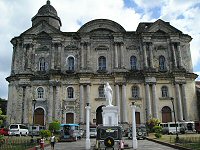 In the town of Taal, like the rest of the Philippines, Catholicism is the prevailing religion; and the Catholic Church was, in most towns and cities, the biggest, most imposing building. Our home was just three or four blocks from the church, the Basilica of St. Martin. We were a devout Catholic family and I don't remember ever missing church on Sunday.
In the town of Taal, like the rest of the Philippines, Catholicism is the prevailing religion; and the Catholic Church was, in most towns and cities, the biggest, most imposing building. Our home was just three or four blocks from the church, the Basilica of St. Martin. We were a devout Catholic family and I don't remember ever missing church on Sunday.
I enjoyed watching the religious processions during Fiesta. Father would hoist me on his shoulder so I could have a better view of the virgins and other saints being carried on men's shoulders.
Click each photo to enlarge.
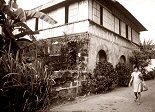
Childhood home of Felipe Morales Reyes in Taal.
|
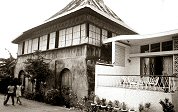
Childhood home of Felipe Morales Reyes in Taal.
|
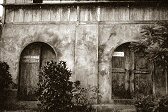
Childhood home of Felipe Morales Reyes in Taal.
|
Another happy event which I associate with my father was being taken by him to see the traveling circus which visited our town once or twice a year. The circus consisted mainly of acrobatics and a couple of performing dogs.
These are the happy memories of my father that still are so vivid to me. If not for them, my recollection of Father would be hazy.
Click each photo to enlarge.
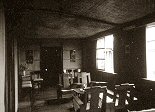
Childhood home of Felipe Morales Reyes in Taal.
|
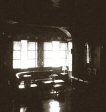
Childhood home of Felipe Morales Reyes in Taal.
|
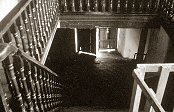
Childhood home of Felipe Morales Reyes in Taal.
|
Most of my life, I have risen early in the morning. The proverbial saying of "rising with the chickens" fits my habit more appropriately than any other person I know. I can not remember a day that I slept past six. This lifetime habit, I am sure, I acquired from our close observance of the Catholic religion.
Mother woke us early, around five every morning, and led us in prayer. Kneeling for most of the fifteen or twenty minutes of the ritual would tax heavily the energy and stamina of modern children, but to us this was routine, a part of our lives.
At sunset, the church bells tolled and we would again kneel while Mother led us in prayer and the rest of the Catholic ritual. At the end of the prayers, we children would approach each of our parents and any other elder relatives who might be in the house, kneel before each of them and kiss the back of their right hand, saying "manu pu". I don't remember what "manu" means. The elders would respond with "kaawaan kanang Dios" meaning "God bless you". I'm sure this rite is what inculcated us with deep and abiding love, respect, and obedience toward our parents. I don't know if in these modern times this simple act of respect and reverence to parents and elders is still practiced in the Philippines. I hope it is.
Mother was skilled at needlework and embroidery which was the Philippines' most important industry. Before the annual fiesta, every town's biggest event, Mother made us children new clothes.
When Fiesta time came, we would have plenty of food for our expected guests mostly relatives from other towns. This was the time for family reunions and families of means made elaborate preparations for this event. Ours was no exception.
Several days before Fiesta Day, brass bands from other towns came and played every day until late at night. They strolled through the town serenading homes. I was so proud when we were serenaded three or four times a day by different bands in their shining and colorful uniforms. The Fiestas ended with the night religious procession, when the town's patron saint or virgin was paraded through the streets, followed by our parish priest. All the brass bands participated in this final event.
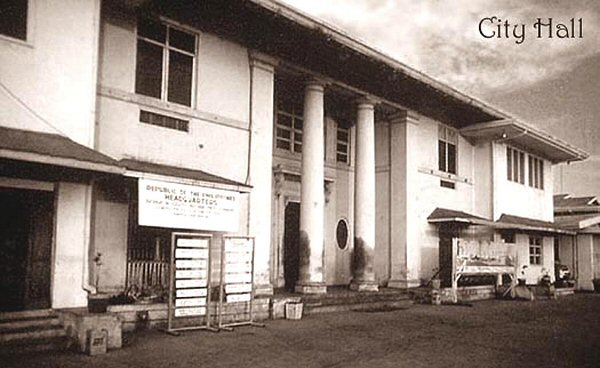
The following day when our guests departed, they would carry parcels of food and other goodies left over from the Fiesta. When my parents went to other town Fiestas, we children always looked forward to their return because of the goodies they brought home with them.
Mother did the marketing and went most every day with Juaquina who carried the market basket. Since there was no refrigeration, they had to go marketing daily to obtain perishable food items like meat, poultry, and fish.
In Taal, the public market was in the center of town. It was here that most of the family needs could be obtained. Food, clothing, household utensils, and such were bought here. On Saturdays, farmers came and sold their produce, then did their shopping with the proceeds. Father usually accompanied Mother on Saturday market shopping.
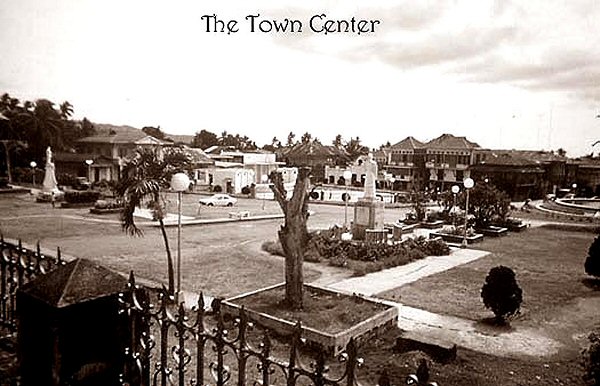
The national sport and pastime of the Filipinos, in my boyhood days, was the cock fight. It was held every Sunday and, as I recall, the entire week preceding the Fiesta. Father had his own string of fighting roosters that he trained. When he took his roosters to the "Sabungan" cock fight arena, he would sometimes take me with him. In Taal, there were two of these cockfighting arenas. Grocery money, as well as fortunes, was won and lost in this Filipino sport. When Father returned home with a live rooster, even if it was seriously injured, we knew he was many pesos richer. But when he returned with a dead bird, we knew he had lost and we would have chicken stew for supper.
Continue to next chapter...

(Introduction)
(Contents)
(Chap 1)
(Chap 2)
(Chap 3)
(Chap 4)
(Chap 5)
(Chap 6)
(Chap 7)
(Chap 8)
(Chap 9)
(Chap 10)
(Chap 11)
(Chap 12)
(Chap 13)
(Chap 14)
(Chap 15)
(Chap 16)
(Chap 17)
(Chap 18)
(Chap 19)
(Chap 20)
(Chap 21)
(Chap 22)
(Chap 23)
(Chap 24)
(Chap 25)
(Chap 26)
(Chap 27)
(Chap 28)

|